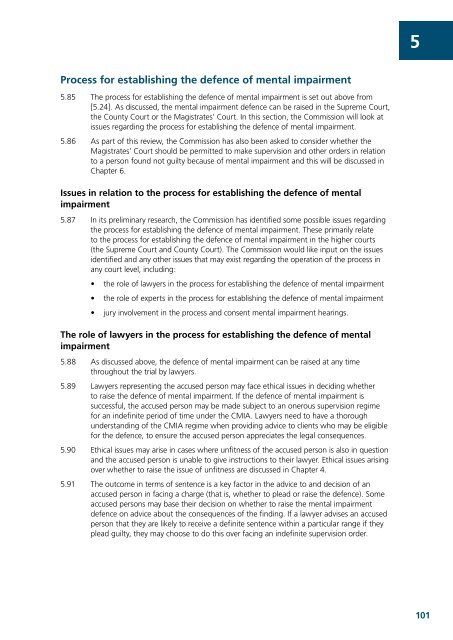Crimes Mental Impairment consultation paper.pdf - Victorian Law ...
Crimes Mental Impairment consultation paper.pdf - Victorian Law ...
Crimes Mental Impairment consultation paper.pdf - Victorian Law ...
Create successful ePaper yourself
Turn your PDF publications into a flip-book with our unique Google optimized e-Paper software.
5<br />
Process for establishing the defence of mental impairment<br />
5.85 The process for establishing the defence of mental impairment is set out above from<br />
[5.24]. As discussed, the mental impairment defence can be raised in the Supreme Court,<br />
the County Court or the Magistrates’ Court. In this section, the Commission will look at<br />
issues regarding the process for establishing the defence of mental impairment.<br />
5.86 As part of this review, the Commission has also been asked to consider whether the<br />
Magistrates’ Court should be permitted to make supervision and other orders in relation<br />
to a person found not guilty because of mental impairment and this will be discussed in<br />
Chapter 6.<br />
Issues in relation to the process for establishing the defence of mental<br />
impairment<br />
5.87 In its preliminary research, the Commission has identified some possible issues regarding<br />
the process for establishing the defence of mental impairment. These primarily relate<br />
to the process for establishing the defence of mental impairment in the higher courts<br />
(the Supreme Court and County Court). The Commission would like input on the issues<br />
identified and any other issues that may exist regarding the operation of the process in<br />
any court level, including:<br />
• the role of lawyers in the process for establishing the defence of mental impairment<br />
• the role of experts in the process for establishing the defence of mental impairment<br />
• jury involvement in the process and consent mental impairment hearings.<br />
The role of lawyers in the process for establishing the defence of mental<br />
impairment<br />
5.88 As discussed above, the defence of mental impairment can be raised at any time<br />
throughout the trial by lawyers.<br />
5.89 <strong>Law</strong>yers representing the accused person may face ethical issues in deciding whether<br />
to raise the defence of mental impairment. If the defence of mental impairment is<br />
successful, the accused person may be made subject to an onerous supervision regime<br />
for an indefinite period of time under the CMIA. <strong>Law</strong>yers need to have a thorough<br />
understanding of the CMIA regime when providing advice to clients who may be eligible<br />
for the defence, to ensure the accused person appreciates the legal consequences.<br />
5.90 Ethical issues may arise in cases where unfitness of the accused person is also in question<br />
and the accused person is unable to give instructions to their lawyer. Ethical issues arising<br />
over whether to raise the issue of unfitness are discussed in Chapter 4.<br />
5.91 The outcome in terms of sentence is a key factor in the advice to and decision of an<br />
accused person in facing a charge (that is, whether to plead or raise the defence). Some<br />
accused persons may base their decision on whether to raise the mental impairment<br />
defence on advice about the consequences of the finding. If a lawyer advises an accused<br />
person that they are likely to receive a definite sentence within a particular range if they<br />
plead guilty, they may choose to do this over facing an indefinite supervision order.<br />
101

















